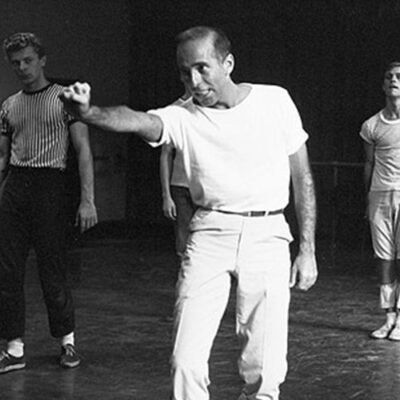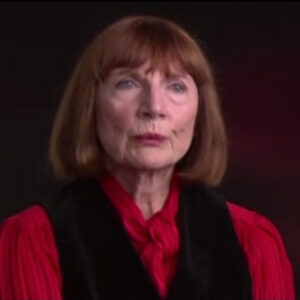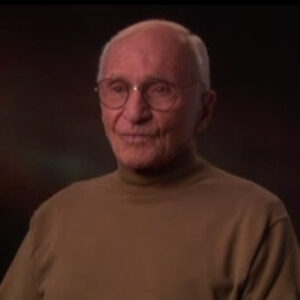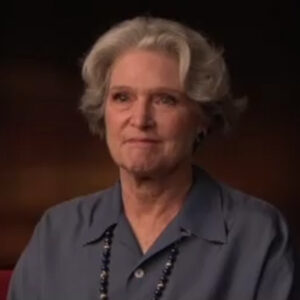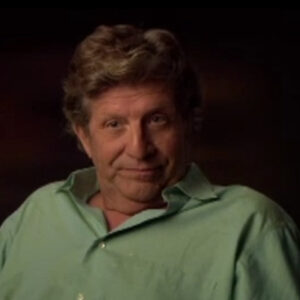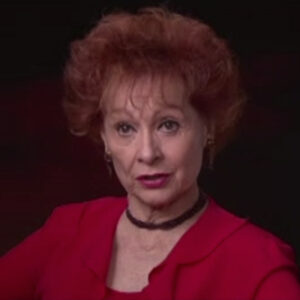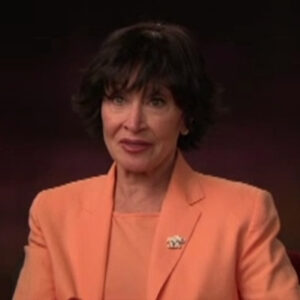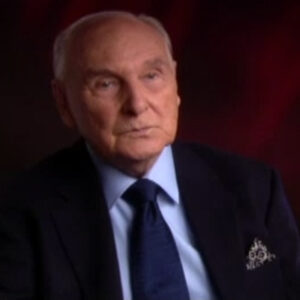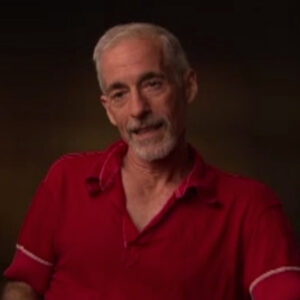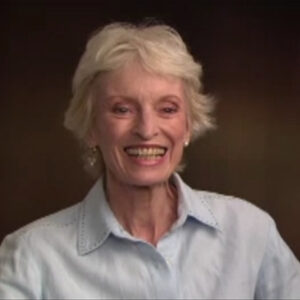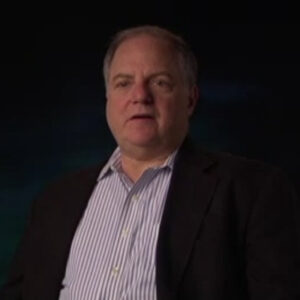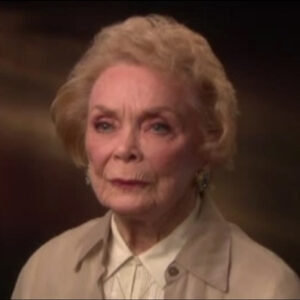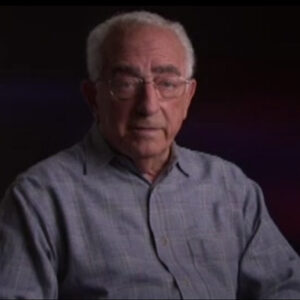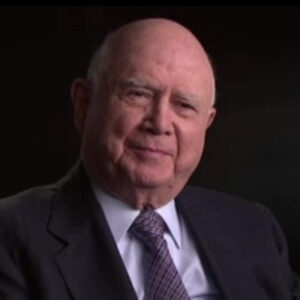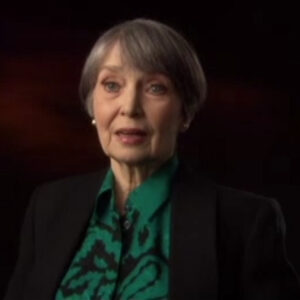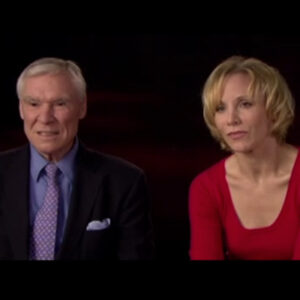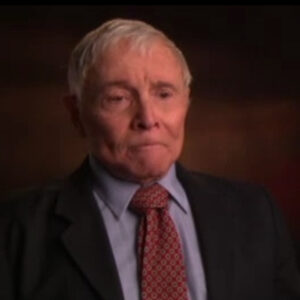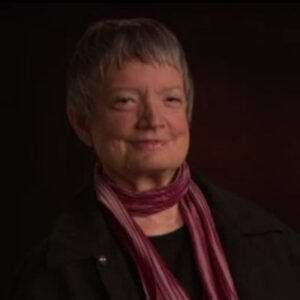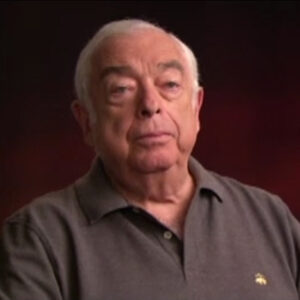Speaker Remember about your audition for Gypsy?
Speaker Oh, that I remember a lot about, I auditioned five times. Yes, the the most memorable was really the fifth audition. Andre Fazzino, von Lupe, Andre Wooziness choreographed it. I mean, I literally had no choreographed. Yeah, I took lessons from Tempest Storm live below my agents. The kid in the agent’s office, he knew Tempest Storm. So I paid. I forget how much an hour for her to teach me the strip walk. Then Colin Romanoff, who was my coach and who then actually was the coach for the whole show eventually, I think to a certain point. And so he played the piano for me. First of all, by the fifth audition, I was told I had to sing Little Lamb. I also for them, maybe I had sung it before. I mean, I really forget all your auditions, but Ethel was there at the audition and she cried when I sang Little Lamb, and I said to my agent afterwards, well, that will be the first song to go. And they did try to cut it. You want me to tell you a story about that or continue with the auditions? OK, all right. So she cried while I sang Little Lamb, then I had then because, you know, I really wasn’t a dancer. And Jerry, of course, is all about dancing, really. So I had a whole strip number that, as I said, had been choreographed by Andre Snootiness and and I wore a black leotard. And I mean, I had a whole kind of strip thing. And I did a strip and I did let me entertain you with a whole strip number. And then they want to see if I was they thought I was too young. It was one of the problems. So I had to read the last scene, which is the scene with Ethel, where, well, it’s after I’m grown up or 29, something like that. So for that I went the Lord and Taylors. In those days, you could take things out on approval. And I took a negligee out of Bruno. I wore it to the audition, of course. Then I took it back and but I, you know, appeared older, which was what that was. Their main concern was that I wasn’t I was too young.
Speaker What were these five auditions about? Well.
Speaker I mean, I don’t know, they just kept calling you back. I mean, there were other people up for the part. I mean, it was like the sort after part at that point. And and I think it was Jerry just wanted to see more of me and see if I really was what he really wanted for that part.
Speaker Did he work with you during the audition?
Speaker He in the last audition, he did get up and do some little steps and things with me. I guess if I could do it, you know, because he knew I wasn’t basically a dancer. I mean, I was a straight actress with where I always thought made it different, my portrayal of the role, because I really was a straight actress, not a musical, you know, done musicals. That’s a different kind of acting, really, I think, anyway.
Speaker What do you remember about the way you moved when he demonstrated for you?
Speaker Oh, he moved beautifully and he’s very you know, just what can I say, he was very eloquent.
Speaker He was very you know, it was a wonderful dancer and very.
Speaker He’s very thin to.
Speaker So you got for it? Yeah, I’m scared to death, you know.
Speaker How did he work with you to help you develop the character?
Speaker Well, you know, Jerry was wonderful at staging, and he really didn’t direct me or Jack that much. So we worked ourselves on the acting scenes more together. Really. I don’t know what Jerry did to get Ethel to act, but for two months, Ethel acted and it was incredible. And then I watched. I used to watch it slowly move back to Ethel, but and I don’t know, because I wasn’t there when he would work with her alone. But with Jack and me, he really he sort of left us alone to do our own thing while he did all the staging, which is what he was really, you know, wonderful at.
Speaker Did he encourage you to do any kind of research for your part or talk to you at all about your preparation?
Speaker Well, research, I mean, I met Gypsie a number of times, was over to her house, she showed me all her scrapbooks, she gave me a lot of information and fun stories and things. And I liked her a whole lot. But did I don’t encourage research? I don’t think so.
Speaker Tell me what you remember about Jerry setting. All I need now is the girl on you and Tulsa.
Speaker Oh, well, you see there again, I was acting behind all four, it was funny story at one point Tulsa asked me to get him a press agent and at that time he was I was actually they were auditioning replacements for him. And I knew it because I’d been in a couple of the auditions.
Speaker So what, though, remember anything about Jerry setting that number on the.
Speaker I remember the number very much, I think was one of my favorite parts of the show actually know he worked with Tulsa to do his thing and he just yeah, I mean, I remember he would dance along and show me what to do in back of Tulsa.
Speaker And but the whole lifting up of and that kind of behind that was that was he know directed me. And that was sort of but that was kind of a lot of that was me and my emotional thing that he taught. You know, we talk about the character in that.
Speaker Why was it one of your favorite numbers?
Speaker Oh, because it was. I guess because I could really be quiet and act and it was a yearning kind of thing, and I like that.
Speaker It’s Arthur, I think, told me he thought that number was just like a little masterpiece of storytelling, you know, and I yeah, I love that number two. But I think it’s because it’s it’s really a duet, but it’s sort of not, you know, and it’s kind of brilliant that way to do it, but only.
Speaker Well, at the end it becomes a duet. In the beginning it isn’t really.
Speaker But, you know, it really is because without the girl, he has no reason to dance.
Speaker Well, that’s. Yeah, that’s true. Yeah.
Speaker Um. Tell me what you observed in Cherrie’s relationship with Murman.
Speaker Well, that’s what I was trying to say.
Speaker See, I don’t know how he how he worked with her private life because it’s funny in music, at least in Gypsy, we would all be your singing thing here. Then you go to the dancing thing here, then you go to a little acting here.
Speaker And it was all like very chopped up and. So I would see Jerry work, you know, like on the Hollywood blond’s number and things, he’d work with us and then I’d see him work with this on together and stuff like that. But and then because I came in at the end of the you know, the the number at the end of.
Speaker I can picture it, but I don’t know exactly what he did.
Speaker He was quite well known as being so. One of the things excuse me, one of the things that Jerry is known for is his ability over his career to work with people who were not trained as dancers, but still make them look very good.
Speaker Can you tell me about.
Speaker And me or or other people in the. Hmm, that’s a toughie. I don’t really. Africa, no.
Speaker Well, you trained as a dancer. Yeah, you did well at one point in the Hollywood planche beyond toe shoes and things, then he gave that up. I don’t know if that’s because I wasn’t any good, you know, or.
Speaker But I mean, the count, I’m trying to think, who wasn’t? Well, of course.
Speaker Oh, well, think about together, yeah. There you have three people who were not trained as classical dancers, right. But you all danced in the No.
Speaker Oh, at the end. Kind of fun. Yeah, but not really dance. Dance.
Speaker But that number has a lot of it to the audience. Yeah, a lot of movement in it. So he made it look as if all together. And I’m just curious what you remember. I wonder how he did that.
Speaker He was just a great state. I mean, I don’t know how.
Speaker OK, well, um, what can you tell me about his eye for detail, how involved was he in the small details of the.
Speaker This.
Speaker Oh, well, and things like, oh, let me see, Mr. Goldstone, for instance, oh, he would go over and over and over and over. That, of course was in the next room with the lamb. I mean, he picked out every little yeah, I remember the rehearsals for that an awful lot, but I didn’t I didn’t really see so much because I wasn’t in the actual scene.
Speaker Um, well, for example, the lamb number, for example, take any number. Can you remember the kind of direction that he gave you? Was it detail oriented?
Speaker No, see, no and little lamb, you’d be working more on the singing.
Speaker OK, not all I can tell you my little lamb story, though.
Speaker Well, never mind. Well, I mean, because like I said to my agent, you know, there will be the first number to be cut. Well, they got cut at one point they cut little lamb. And I said, Arthur, actually, I don’t know how I had the gumption to say it, but I said, if that number goes, I go. And I guess Arthur went back to Jerry and it went back. You know, I don’t know how I ever had the nerve to say that, but I really felt that strongly about it.
Speaker Well, I think Julie also felt very strongly about it.
Speaker Yeah, he liked this. I was originally called Untamed. You know, I was a drunk. So it’s a very hard song to sing, actually.
Speaker There’s a story about Julie talking to Gerri as well, you know about that.
Speaker Well, maybe, I don’t know. No, no, no, I don’t. Um.
Speaker What finally happened when he got to staging the strip? Oh, God. Jerry Friedman told me. That Jerry staged this trip originally and Jerry remembers seeing it in an early, very, very early one.
Speaker Maybe it was just oh yes, that was the wonderful run through. What a jury, Friedman, say. I mean, why did he. I don’t know what happened because it was wonderful then and then. Jerry never wanted to deal with it again. And I don’t know what the problem was, except that maybe, you know, it was I don’t know. I’ve always I mean, it was terrible at one point that Elfa walking in back of me in Philadelphia, which, of course, frankly, I hated. I didn’t want to back there. So they got rid of that. I don’t know, but he had a real blog about it. He actually had said he said to me, I know I’ve got to get to work on the script, the strip or what. I’ve rephrased it and he didn’t. And then he kept procrastinating.
Speaker And what finally happened?
Speaker Well, he finally well, after Ethel Merman traipsing back and forth, didn’t work, he tried a few other things and it finally. It got worked out, but the last night I was in the show, actually, I did the script the way I wanted to do it. I mean, I ripped the song and I threw pennies to the band and I really did a little bit jazzy bumps and grinds and things. And they my understudy, they put it in. It’s interesting they changed how they changed your strip. Which, of course, I was curious because I would like to have done it all along a little bit, you know, jazzier or Thrawn word, but you know what I mean?
Speaker Jerry told me that the run-Through that we’re talking about. Yeah, he said it was. You said you were absolutely gorgeous.
Speaker And it was just amazing. But there were objections to it because some of the collaborators felt it was too overt or. They didn’t want it to go that far.
Speaker What do you mean to avert on what terms of either costume or how much you were taking off or how you were taking?
Speaker I mean, on my strip number of that one? Oh, that’s interesting. Go to Liotard, most of it. I don’t know, but I think it went. I don’t know, I wonder if Essel didn’t have something to do with it, but that’s just my personal opinion, I.
Speaker I wasn’t there. I know. OK, I don’t know. Yeah, I don’t think so.
Speaker I think it had more to do with Arthur and Julie. Do you know anything about the. Hmm, no, um.
Speaker Time to stop for a second, if you would just wait a minute. Tell me what a typical rehearsal with Jerry was like. What’s he like with the cast?
Speaker Well, like the calendar, you I mean, the the the group numbers and things.
Speaker God was like, oh.
Speaker Patient suite.
Speaker Oh, OK, with me he was. He was very I think he was very I really liked him. I mean, I felt like working with him was wonderful. I mean, with Lane Bradbury, there’s, you know, he had a chance. It was just awful. He hated her. So that was awful. But you can ask lateness story, so. And with Jack, I don’t know, Jack and I sort of hung up to a certain extent. Oh, I was. But no, you’re asking me about Gerry working with the groups I remember. I think he was actually the Hollywood blond’s. I mean, that number kept changing. I think he must have been very impatient with the whole thing because it didn’t work. I mean, you know, we kept trying different things and obviously it wasn’t working so well.
Speaker The other thing you said to me.
Speaker And I’m wondering why and what that had to do with Jerry.
Speaker Oh, it really didn’t have to do with Jerry. It had to do with el-Fadl and. It had to do with to do that, and I think she was enormously jealous of me and. And I had had a stage mother and my mother had said, well, she took me a hologram, I was five to be in the movie.
Speaker She thought I was on the stage and and she said, you know, work now. You can play later. So I quit and played later when most people were just starting to go to work. You know, I was said, OK, now it’s time to play and I’m going to play. And I think I actually the show sent me into analysis.
Speaker And I mean, I remember my first analyst and she said she said, well, no wonder, Sandra, you’re, you know, playing the story of your life every night. It’s terribly difficult. And that’s not the things I used to sense. Memories and things, really, because I was studying for Lee Strasberg. By the time I got this for quite some time, I had been, but.
Speaker What it was, it was and I used to look at Ethel every night and I guess, what was she, 52 or 53, something like that. And I used to think, I don’t want to be that when I’m her age. I don’t want to be like that doing that. And it was a deciding factor in my quitting. I mean, I didn’t quit right away because I couldn’t afford to, you know, I had to work and do other things. But it really it changed my whole feeling about. And the other thing was, I really like the fact that I studied singing before. And the reason I really wanted to do a musical was I wanted to be able to sing and act at the same time.
Speaker And I’m not sure you really can act the way I was used to acting in Lee’s class and things, which is and get the voice out at the same time, because the emotions make up all the vocal chords and they really do. I mean, Callas did it somehow, but that’s why I think straight acting is so different from musical acting, because you just. If you’re out there and you suddenly have to sing a song, I mean continuity, it all gets changed. You know, some of the reason I don’t when you ask me questions that I don’t know is because I was often my own little world doing my own, working on it. And I don’t know what went on with those guys between Arthur Laurents and Jerry and all that stuff. You know, I was. We just don’t know a lot about that.
Speaker But you must know that, Julian Jerry, what kind of relationship did they have?
Speaker Well, I didn’t know Julie till after I was in the show, you know, so I don’t. I mean, he was bringing me milkshakes backstage that was on and he was a. I don’t know what that. That’s interesting, I know I remember one night I was taken, I was allowed to go to Steve Sondheim, played some music for them, and, of course, for Steve wasn’t allowed. I really like Steve a lot, but he wasn’t you know, nobody want to know about his music. So there was all that going on. Oh, no.
Speaker There’s a lot of stuff going on, but I wasn’t really privy to it because I’m on the other side of the footlights.
Speaker OK, um, what do you remember about the reception to the show?
Speaker Oh, you mean press wise and all that, or you mean opening night?
Speaker Oh, God, it was awful. Well, I mean.
Speaker I mean, I had some personal problems going on. Well, it got really, I guess, rave reviews. I remember there was this big party and I remember Julie was sitting at the piano playing. He always wanted to do that, just like I always wanted to be asked to sing people to ask me to sing. I would never do it. And I remember Ruth Juvenile picked me up and said, you know, it was just terrible, a huge scene. I was I mean, this, you know, and she and she said that is good reviews, as you thought you’d get. Did you like just so said. Well, Ruth DuVernay, who was where Julie was going with like, I don’t think you want to go there. I mean, but, you know, let’s anyway. So that was opening night. So opening night. Oh, and opening night was and actually I, I mean I remember going out to party and I was I had to be hustled home because of I’m making this scene. So then Julie had his son take me home.
Speaker Or, you know, because there was all this terrible stuff going on that because then there was Duban, I guess was suddenly realized that Julie had a hankering for me or whatever. But but it really wasn’t until after the show opened because I had actually I had a boyfriend when I first started out and so.
Speaker And.
Speaker I mean, that’s one of the reasons why Gypsys a terrible experience, because it’s all those things that were going on and I was constantly terrified. I was in a way, I was kind of scared of Jerry, although, I mean, I really liked him. But I think I was quite scared and I wasn’t scared of Arthur Laurents.
Speaker Obviously, I was scared. Actually, I probably was scared of David. Oh, God. David Merrick. Oh, I mean, he wouldn’t even let me get a cooler jacket because I was so cheap to get a doctor’s certificate saying my back’s breaking out. Leland Heyward I liked I remember very much.
Speaker Why were you scared of Jerry?
Speaker I don’t know, I guess well, I guess probably because I thought I have a real low self-esteem and I’m sure I thought he didn’t like me because I didn’t dance really and because of his not being able to work on the number and taking so long about it, you know, I mean, you’re a young kid. You think it’s my fault. I mean, it was always my fault with my mother. And so I thought a lot of it was my fault. And I felt he didn’t really I was really taught. He didn’t probably like me. And I think today I think it is true. I think Jerry didn’t like me. I don’t well, I don’t really know. I always say because I wasn’t a dancer, but it’s not a dancing part. And I don’t think you could make it into a dancing part, but I’m not sure Jerry like Gypsy that much in all of his career. There’s things I’m not sure. Gypsy is one of his favorites, and I don’t really know why.
Speaker You have no idea what I mean, what makes you say that?
Speaker Well, it was just I don’t think it’s something I don’t know. I just don’t think it was. Maybe he didn’t like illegal, I don’t know, but I worked with her. Oh, I know. I know. Can’t be that. I mean, I just always thought he didn’t like me.
Speaker In the show.
Speaker And then I would see him afterwards, and I’d always have to say, son, remember me jittery because I would see him as the prince of his palace and things. I’m a huge fan and I used to go always would go and see him and things he’d do and I’d see him at these things. This was when I was with my my second husband. And we used to go to all those things. And I’d say it’s like he wouldn’t he didn’t know who the hell I was.
Speaker It is past that I don’t know what the problem was about this trip, but, um. Since it started out good. And then tinkering started, I guess, right? Yeah, um. Did you have any sense? That it came from Jerry or that it came from others. That he didn’t just say, oh, that’s great, let’s just leave it that way.
Speaker Oh, it must have come from others, I would think, because I think in Philadelphia there was such a to do about it because some nights I’d wear, you know, the strip that it was like a bikini is all. And some nights I wouldn’t and.
Speaker I mean, it was a huge, awful time, and I never knew quite what was going on.
Speaker So how did it manifest itself in terms of your own personal experience? You’d go to the theater and there would be another strip rehearsal or what?
Speaker Oh, yeah, we were always, you know, out of town, you’re always redoing everything, I mean, they finally freeze it, thank God, at some point. But no, it would be sure rehearsals every day and changing and trying something else. And I mean, I was just frustrated with it. I mean. Yeah, yeah, I think he was very frustrated and he did say to me, you know, he was sorry about it, just couldn’t he couldn’t do it. I don’t know why. And I mean, I didn’t know him well enough to say, you know, well, let’s sit down and talk about this. I was petrified, you know? I mean, today it’s something like that happened. I would say, well, now let’s have a little talk here. But I couldn’t do that in those days. I wouldn’t.
Speaker I think it’s possible that it has much to do, it had to do with the. I don’t know.
Speaker Oh, well.
Speaker He sort of intimated that it did have something to do with him, but I don’t know what you know, he never said.
Speaker What?
Speaker I’m curious because clearly his initial instinct worked because everybody says it was great.
Speaker What do you mean at that other rehearsal? Well, yeah, yeah, so I mean, it was wonderful that and everybody says that was the best that it ever was. So something happened and somebody’s got to and somebody wanted to change it. I know who might know the answer to this question of that call. That’s my good friend George first. But you know why? Oh, because he’s very good friends with Steve.
Speaker And Steve might, you know, know what was going on and things.
Speaker Well, I think it was Arthur and Julie, OK? It’s what I’ve been told is correct. Thank you. Concerned about it being too vulgar or going too far, and Julie just.
Speaker Well, I wasn’t going to take my clothes off, I have to tell you, that’s something I wouldn’t do. Arthur was very, very supportive of me, though. And I remember there was one scene that got cut, which was really a transition scene, which was backstage after, you know, after she says I’m pretty mama and then goes on and does it. And then there was a scene, another scene with the mother backstage that went that made the the the skip into the next. What do I say? You know, age change or whatever, and it got cut because it was the show was getting too long, but it was the real transition scene that made it very. Because the next time you see them, you see them, you see that big Christmas tree and all that stuff, and it was a transition scene before that was wonderful. And Arthur had written a wonderful scene, and I think he was very sorry to see that go. And I’m sorry they cut that if they cut out the Hollywood ones where they cut that out.
Speaker But, you know, um.
Speaker You know, some people think that Gypsy is the perfect musical, um, George Friedman said, you know, it was like the docking of the Queen Mary. Was this perfect? What do you think makes it so great?
Speaker Well, it’s all because it’s. Well, first of all, it wasn’t well-loved in the matinees. The women the mothers hated it. My mother’s comment when she read the script was, wasn’t that girl good to her mother? That’s my stage mother. No, but the matinees that women really didn’t like it, but I think it’s because it has a brilliant book and the lyrics and the whole I mean, it’s a it’s a serious straight musical. And those are my old fashioned actress words when I say straight an actress and a lot of. And I think that’s what it is because it’s a real book. Musical.
Speaker And how many have there been at that point and how many have there been since?
Speaker I mean, it’s a series dramatically. Yeah, I think it’s funny, I mean, what I learned from one thing was, is how much I love dance that I could do it.
Speaker For.
Speaker And I mean, I just. I loved his staging and everything, but that’s not the only, you know, personal, so I don’t know if it is or isn’t what was said.
Speaker He was wonderful at staging what was so great about his stage and the different shaded at him from other musical theater directors, in your view?
Speaker Oh, my God. If it’s like night and day, just it’s just I think a station is just brilliant. It’s not. And the and and and it’s never it’s not repetition. It’s not one thing here. And then the other thing there, it’s just of course, that’s in it’s dancing. It’s always different. And I just think he’s brilliant. That’s just brilliant.

